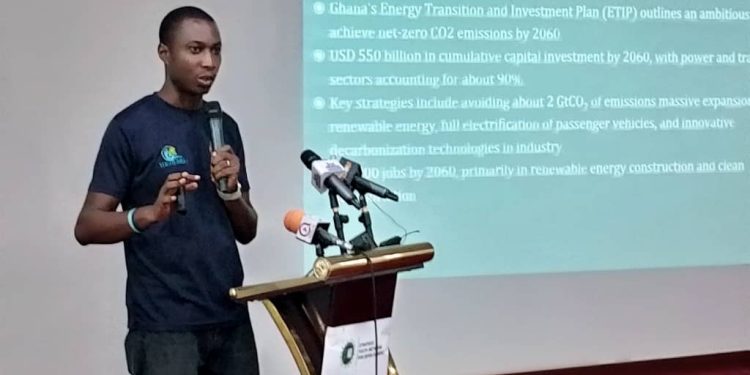Youth Demand Greater Role in Ghana’s Energy Transition Agenda – SYND Report Reveals
A new research report by the Strategic Youth Network for Development (SYND) has called for increased youth participation in Ghana’s energy transition agenda, citing the need for structured engagement, skills development, and financial support to harness the potential of young people in the clean energy sector.
Launched on Tuesday, the report titled Youth Engagement in Ghana’s Energy Transition highlights key gaps in the country’s efforts to achieve net-zero greenhouse gas emissions. It emphasizes that while the Ghana Energy Transition Framework and the Ghana Energy Transition & Investment Plan (GETIP) are essential, youth inclusion remains limited.
According to the report, 71% of young people express a strong interest in contributing to Ghana’s energy transition, but many lack the necessary opportunities and resources. With 73.5% of Ghana’s population under the age of 36, and 38.2% in their prime working years (15-35 years), the report stresses the importance of placing young people at the center of energy transition efforts.
Key Recommendations
National Coordinator of the Youth in Natural Resources & Environmental Governance (Youth-NREG) Platform, Justina Amoah, underscored the urgency of empowering young people to drive Ghana’s clean energy future.
“As Ghana embarks on its ambitious energy transition journey, the active participation of the youth is critical to ensuring a just, inclusive, and sustainable (energy) transition. The shift to renewable energy presents immense opportunities for job creation, green entrepreneurship, and skills development.
“To fully seize these opportunities, young people must work together with government, private sector, civil society, and development partners to equip them with the necessary skills, resources, and platforms to contribute meaningfully to Ghana’s clean energy future,” she stated.
The report proposes several recommendations, including:
Clean Energy Skills Development – A comprehensive program aligning industry needs with educational curricula, including vocational training and hands-on internships.
Financial Support for Youth Innovation – The establishment of a Youth Clean Energy Entrepreneurship Fund to assist young innovators and startups in overcoming financial barriers.
Policy Inclusion – Youth participation in the development, implementation, and review of key national policies such as the Renewable Energy Act, National Climate Change Policy, and Energy Transition & Critical Minerals Framework.
Social and Environmental Safeguards – Measures to protect young people, particularly in resource-rich communities, from human rights abuses and social exclusion in the green mineral rush.
Call to Action
Gloria Kafui Kuzo, SYND’s Focal Point for Energy Transition and National Organizer of the Ghana Energy Transition Consortium, reiterated the call for urgent action.
“Achieving a sustainable and inclusive energy future requires active youth participation, innovation, and leadership. Recognizing the vital role of Ghanaian youth in advancing clean energy solutions, the Strategic Youth Network for Development advocates for intentional and urgent efforts to integrate young people into the country’s energy transition agenda,” she quipped.
The research also underscores the economic benefits of youth participation, with GETIP estimating that the transition could generate 400,000 jobs in renewable energy, energy efficiency, and sustainable transport sectors by 2060.
SYND is urging policymakers, industry players, and development partners to take deliberate steps in integrating young people into Ghana’s energy transition agenda, ensuring a just and inclusive shift towards clean energy.








